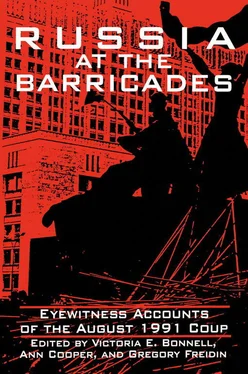In the last three years, we have not done a good job building housing, and many citizens who expected that we would carry out the program that we had announced at the outset of perestroika [have been disappointed]. Unfortunately, as it turned out, we were not up to the job, which is why I think we are now confronted with three major tasks. The first is food; the second is housing; and the third is transportation and energy, because we are moving toward winter. The situation in the energy industry is now very tense, and there, too, we need extraordinary measures if we are to avoid plunging the country into a difficult situation because of the winter.
Argumenty i fakty: Apart from his post as President, M. S. Gorbachev also holds the post of General Secretary of the Central Committee of the CPSU. Who will be discharging the duties of the General Secretary of the Central Committee? And my second question: As we have learned today, a series of newspapers, including Argumenty i fakty, Moskovskie novosti, Kuranty, Stolitsa , and a few others have been declared closed. For how long are they to remain closed, and when will they be opened? Thank you.
Yanaev: I think that since we are introducing the regime of a state of emergency, we will have to re-register some of our mass-circulation publications. Re-register. We are not talking about closing down newspapers; we are talking about re-registration, because this chaos that has overtaken the country is due, in part, to some of the mass-circulation organs. As to the post of the General Secretary, I would not like to comment on that. We have a Deputy General Secretary. He is fully capable of functioning, he is working, and I think that the plenary session of the Central Committee or a Party Congress can resolve this issue. I am now discharging the duties of the Acting President of the country, and I would not like to use my authority, or lack thereof, in order to influence the decision making of party organs.
Question: Mr. Yanaev, sir, what response did you get to your appeals to the heads of state and the Secretary General of the United Nations?
Yanaev: I must state that we are analyzing very carefully the statements of foreign statesmen and politicians, and I must state that their reaction is rather restrained, because, apparently, there are very few facts available at this point to take a definitive stand. I am familiar with the last statement by President Bush, where he expresses his hope that those foreign policy commitments that the Soviet Union had made would be adhered to in the future, which is what I have confirmed today, speaking before this audience, which is what we affirmed in our statement right after the Emergency Committee had been set up.
Novosti Information Agency: I have two questions to Boris Karlovich Pugo and to Comrade Starodubtsev. A lot has been written and said lately about the war on crime. Boris Karlovich, what new measures are you planning to undertake in this regard? And the question for Comrade Starodubtsev: Do you have the support of the mass of the peasantry, and do you think that the mass of the peasantry will support the Emergency Committee?
Pugo: In answer to your question, I would say that it is unlikely that we will be able to find any new, entirely new ways for combating crime that have not been used before. I believe that first of all, the organs of law and order, all of them, must improve their work. We must be more demanding with law-and-order personnel. They must improve their work to a considerable degree. We must create the conditions so that professionals can be more effective. I especially stress professionalism—this is my credo . Working in the Ministry of Internal Affairs, I believe that we can do a lot following this precept. As to concrete measures, I think that such methods as joint [militia-military] patrols of city streets have brought substantial results, as evidenced by the experience of over fifty cities. You may recall that at first, this measure was met with some sort of suspicion, but it has demonstrated its effectiveness. Indeed, recently even the Mayor of Leningrad, Sobchak, has resorted to this method of policing.
We must restore our ties to the community, but, above all, in my opinion, we must work with the leadership of law-and-order organs in such a way that all the potential of our personnel can be realized.
Starodubtsev: The greatest losses during the period of perestroika have, of course, been sustained by the peasantry; especially this year, the blow has been most crushing. The majority of the collective and state farms, along with the nascent individual farms, are today on the brink of disaster. The price equilibrium between the city and the countryside has been undermined. Lack of fuel and spare parts and a sharp reduction in other technical supplies have created a very difficult situation for the peasantry.
I think that the peasants, driven to despair, hope that, at long last, order will be restored, and that our society will turn its gaze to the peasantry and will help peasants to find a firm footing, to experience revival.
Nezavisimaia gazeta correspondent Tatiana Malkina: Could you please say whether or not you understand that last night you carried out a coup d’état? Which comparison seems more apt to you—the comparison with 1917 or with 1964? [41]This is the first question.
The second question concerns newspapers. First, how long will it take to re-register newspapers, and what criteria will decide whether or not a particular publication should be re-registered? Who will deal with this? Will political censorship be introduced in the re-registered publications? Thank you.
Yanaev: With regard to the re-registration of newspapers, we will try not to drag out this process. I would not like to comment now on the criteria that will be used as the basis for this re-registration.
As for your allegation that a coup d’état was staged last night, I would beg to disagree with you, inasmuch as we are following constitutional norms. And I assume that confirmation by the USSR Supreme Soviet of the decisions we have made will enable us to state that absolutely all the juridical and, so to speak, constitutional norms have been observed.
It does not seem to me correct to draw a comparison with either 1917 or 1964. I believe any analogy here is simply dangerous.
Correspondent from the Italian newspaper Corriere della Sera: A question about Mikhail Sergeevich Gorbachev. Did you discuss with the President your takeover of power? Did he agree with you? Why is there no medical report on the state of his health? And a second question: Bearing in mind the wording of your communiqué, did you ask for advice from General Pinochet? [42]Thank you.
[Laughter in the audience.]
[Yurii Gremitskikh, an official of the Press Center: “Please refrain from displaying emotion. This is a press conference.”]
Yanaev: I imagine that at some time we will publish the medical findings on Mikhail Sergeevich Gorbachev’s state of health. As concerns your assertion that we took power from President Gorbachev, I would like to express disagreement with that, too, because what we are talking about is a temporary inability on the part of the President to fulfill his duties by virtue of the state of his health. And in accordance with the Constitution, the duties of the President pass temporarily to the Vice President or the Chairman of the Supreme Soviet.
ADN [German News Agency]: Will the introduction of the state of emergency affect the agreements with Germany; specifically, the timetable for the withdrawal of Soviet troops from Germany? Has Chancellor Kohl reacted in any way?
Yanaev: I have already stated this in my opening statement, and the Emergency Committee has made its statement on this matter: We affirm all the commitments which the Soviet Union has assumed in the sphere of foreign policy, including our obligations with respect to Germany.
Читать дальше












